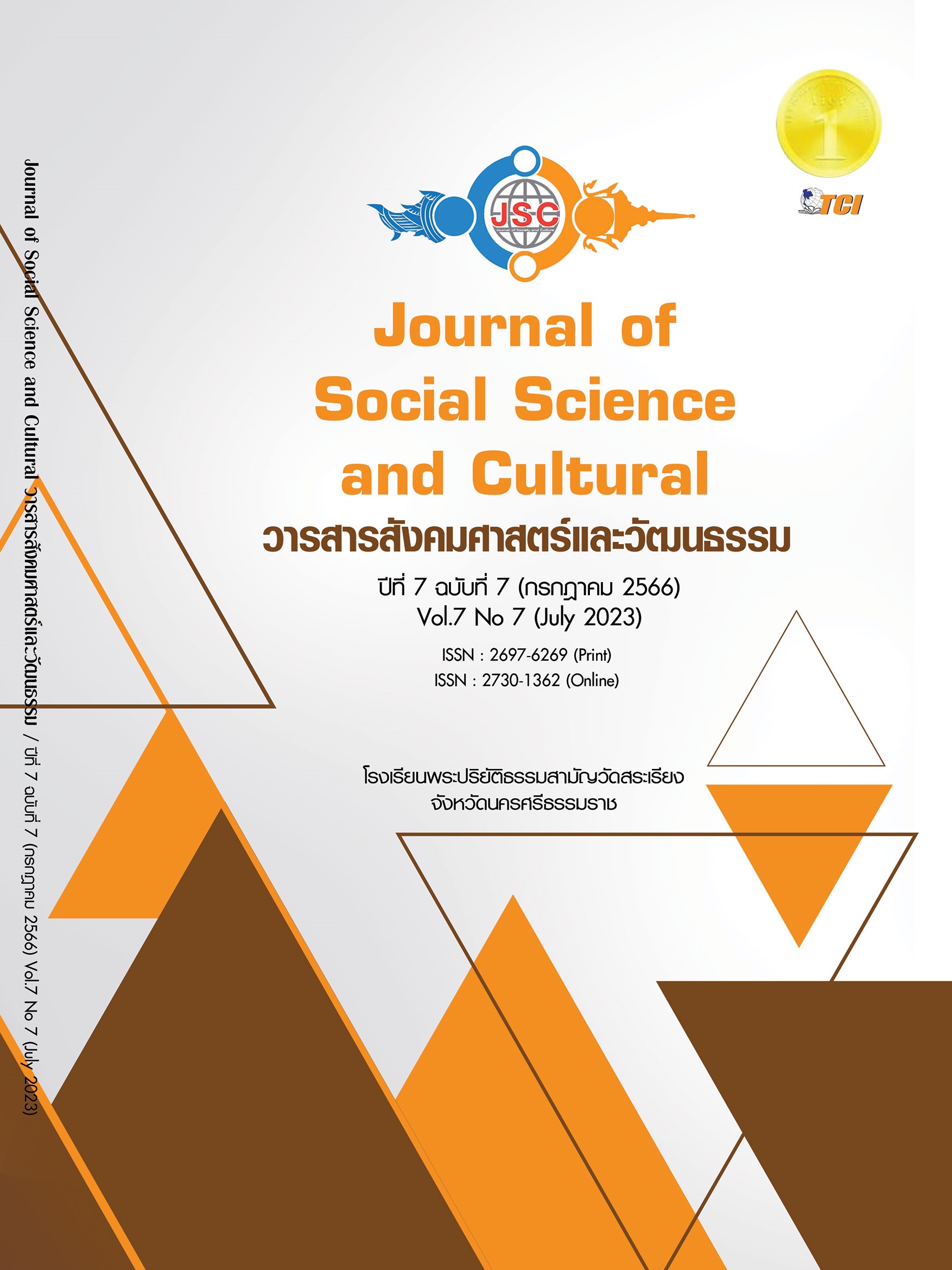LEARNING MANAGEMENT BY USING THE FLIPPED CLASSROOM APPROACH TO DEVELOP PRACTICAL SKILLS AND LEARNING ACHIEVEMENT OF PRIMARY 5 STUDENTS UNDER BANGKOK ADMINISTRATION
Main Article Content
Abstract
The objectives of this research were to: 1) compare practical skills and learning achievement of primary 5 students at Soi Annex School (Kanchanaphisek 2) under Bangkok Administration between students who received the flipped classroom approach learning and students who received traditional learning, and 2) compare the learning achievement of primary 5 students at Soi Annex School (Kanchanaphisek 2) under Bangkok Administration before and after using the flipped classroom approach learning and traditional learning. This study employed a quasi-experimental design with a pretest-posttest nonequivalent-group design. The sample consisted of 66 primary 5 students from Soi Annex School (Kanchanaphisek 2) under Bangkok Administration, during the second semester of the 2022 academic year. The study utilized a cluster sampling technique, with 2 classrooms, and a simple random sampling of 2 methods of learning management to enter the classroom as an experimental group and a control group. The research instruments included the flipped classroom approach learning lesson plans in the Music-Thai Dance course, the traditional learning lesson plans in the Music-Thai Dance course, the assessment of practical skills in Thai dance, and the learning achievement tests in the Music-Thai Dance course. The statistical analysis included mean, standard deviation, and t-test. The results revealed that: 1) the practical skills and learning achievement of students who received the flipped classroom approach learning were significantly higher than students who received traditional learning at the .05 level, and 2) the learning achievement of students who received the flipped classroom approach learning and traditional learning after learning management was significantly higher than before learning management at the .05 level.
Article Details
References
เขมิกา เขมาระกุล และคณะ. (2566). ผลของการจัดการเรียนรู้โดยใช้ห้องเรียนกลับด้านร่วมกับเทคนิค KWDL ที่มีต่อความสามารถในการแก้โจทย์ปัญหาคณิตศาสตร์ ของนักเรียนชั้นประถมศึกษาปีที่ 4 สังกัดมหาวิทยาลัยของรัฐ. วารสารสังคมศาสตร์และวัฒนธรรม, 7(03), 47-63.
กระทรวงศึกษาธิการ. (2551). หลักสูตรการศึกษาขั้นพื้นฐานพุทธศักราช 2551. กรุงเทพมหานคร: โรงพิมพ์ คุรุสภาลาดพร้าว.
ชนสิทธิ์ สิทธิ์สูงเนิน. (2560). การพัฒนากิจกรรมการเรียนการสอนโดยใช้กรณีศึกษาเป็นฐานร่วมกับการเรียนรู้ แบบร่วมแรงรวมพลังเพื่อส่งเสริมความสามารถในการจัดการเรียนรู้ ของนักศึกษาครู คณะศึกษาศาสตร์ มหาวิทยาลัยศิลปากร. นครปฐม: มหาวิทยาลัยศิลปากร.
ธิติมา อ่อนเยียะ และคณะ. (2565). การพัฒนาสื่อวีดิทัศน์ปฏิสัมพันธ์ ร่วมกับ การจัดการเรียนรู้ห้องเรียนกลับด้าน แบบออนไลน์ เรื่อง ภาษาท่าและนาฏยศัพท์ สำหรับนักเรียนชั้นประถมศึกษา ปีที่ 4. วารสารเทคโนโลยีและสื่อสารการศึกษา คณะศึกษาศาสตร์ มหาวิทยาลัยมหาสรคาม (JETC), 5(15), 60-72.
พิมพันธ์ เดชะคุปต์ และพเยาว์ ยินดีสุข. (2557). การจัดการเรียนรู้ในศตวรรษที่ 21. กรุงเทพมหานคร: โรงพิมพ์แห่งจุฬาลงกรณ์มหาวิทยาลัย.
วิจารณ์ พานิช. (2556 ก). การสร้างการเรียนรู้ สู่ศตวรรษที่ 21. กรุงเทพมหานคร: เอส.อาร์.พริ้นติ้ง แมสโปรดักส์.
วิจารณ์ พานิช. (2556 ข). ครูเพื่อศิษย์สร้างห้องเรียนกลับทาง. กรุงเทพมหานคร: เอส.อาร์.พริ้นติ้ง แมสโปรดักส์.
สยา ทันตะเวช และชนะศักดิ์ วงษ์วีระวินิจ. (2565). รูปแบบการจัดการเรียนการสอนวิชาดนตรีในระดับชั้นมัธยมศึกษาปีที่ 1 ในช่วงสถานการณ์ไวรัสโคโรนา 19 แพร่ระบาด: กรณีศึกษาวิทยาลัย. วารสารดนตรีรังสิต มหาวิทยาลัยรังสิต, 17(1), 1-16.
สำนักวิชาการและมาตรฐานการศึกษา. (2552). ตัวชี้วัดและสาระการเรียนรู้ศิลปะ ตามหลักสูตรแกนกลางการศึกษาขั้นพื้นฐาน พุทธศักราช 2551. กรุงเทพมหานคร: โรงพิมพ์ชุมนุมสหกรณ์การเกษตรแห่งประเทศไทย จำกัด.
สุทธิพร จิตต์มิตรภาพ. (2553). การเปลี่ยนแปลงของโลกแห่งการเรียนรู้ในศตวรรษที่ 21 และการพัฒนาสู่ “ครูมืออาชีพ”. กรุงเทพมหานคร: สำนักงานคณะกรรมการการอุดมศึกษา กระทรวงศึกษาธิการ.
Awidi, I. T. & Paynter, M. (2019). The impact of a flipped classroom approach on student learning experience. Computers & education, 128(1), 269-283.
Best, J. W. & Kahn, J. V. (2003). Research in Education 9th ed. Boston: A Pearson Educational Company.
Çakiroğlu, Ü., et al. (2020). Flipping the experimentation process: influences on science process skills. Educational Technology Research & Development, 68(6), 3425–3448.
Erbil, D. G. & Kocabaş, A. (2020). Flipping the 4th grade social studies course in a cooperative way: Effects on academic achievement and motivation. Studies in Educational Evaluation, 66, 100878. doi:https://doi.org/10.1016/j.stueduc.2020.100878.
Gómez-García, G., et al. (2020). The contribution of the flipped classroom method to the development of information literacy: A systematic review. Sustainability, 12(18), 7273.
Huang, Y. M., et al. (2022). Applying a business simulation game in a flipped classroom to enhance engagement, learning achievement, and higher-order thinking skills. Computers & Education, 183, 104494. doi:https://doi.org/10.1016/j.compedu.2022.104494.
Leung, J. Y., et al. (2014). Short review of the flipped classroom approach. Medical Education, 48(11), 1127-1127.
Nja, C. O., et al. (2022). Students’ attitude and academic achievement in a flipped classroom. Heliyon, 8 (1), e08792. https://doi.org/10.1016/j.heliyon.2022.e08792.
Ruiz-Jiménez, M. C., et al. (2022). Students’ attitude: Key to understanding the improvement of their academic RESULTS in a flipped classroom environment. The International Journal of Management Education, 20(2), 100635. doi:https://doi.org/10.1016/j.ijme.2022.100635.
Wang, Q., et al. (2022). Effects of flipped classroom on nursing psychomotor skill instruction for active and passive learners: A mixed methods study. Journal of Professional Nursing, 39, 146-155.
Zhao, J., et al. (2021). Effects of gamified interactive e-books on students’ flipped learning performance, motivation, and meta-cognition tendency in a mathematics course. Educational Technology Research & Development, 69(6), 3255–3280.
Zheng, L., et al. (2020). The effectiveness of the flipped classroom on students’ learning achievement and learning motivation. Journal of Educational Technology & Society, 23(1), 1-15.
Zheng, X., et al. (2020). A pilot study examining the impact of collaborative mind mapping strategy in a flipped classroom: learning achievement, self-efficacy, motivation, and students’ acceptance. Educational Technology Research & Development, 68(6), 3527–3545.


